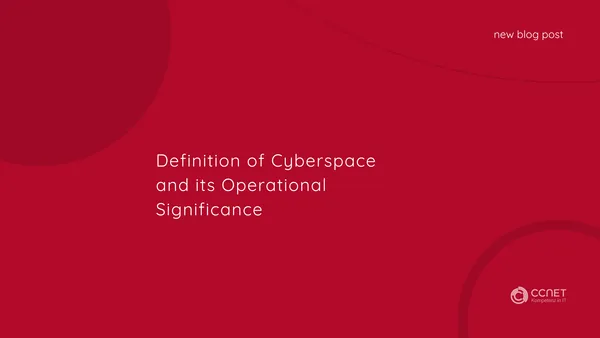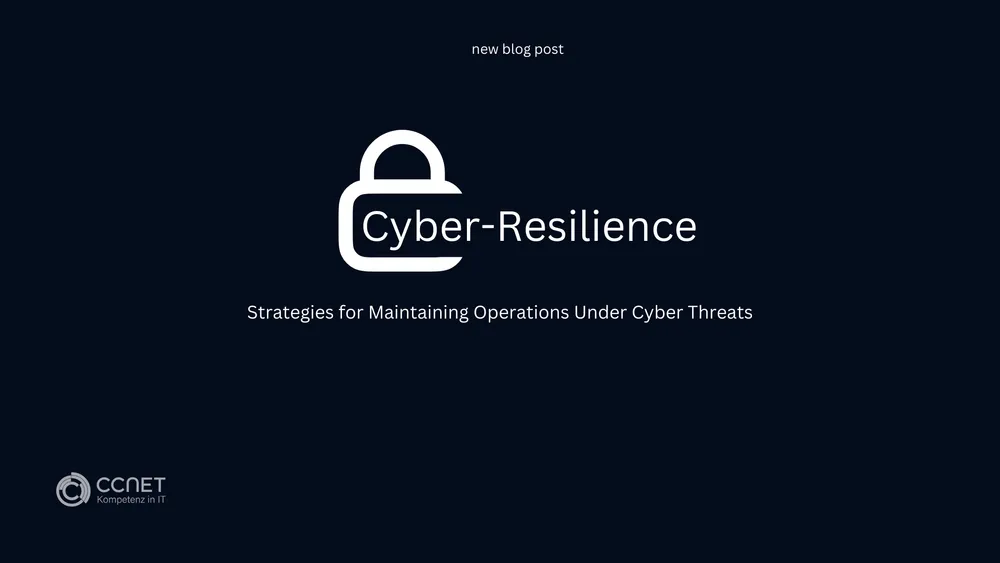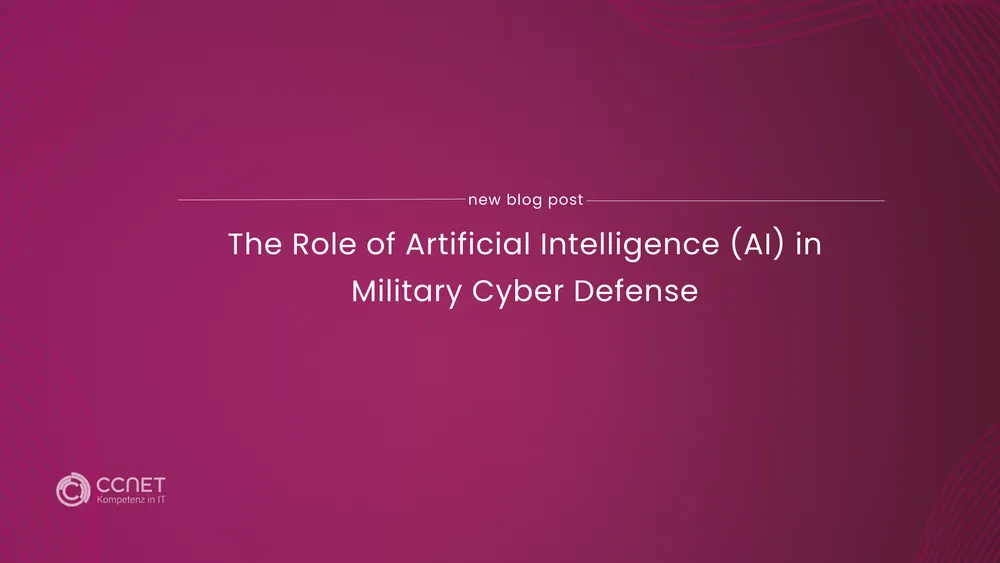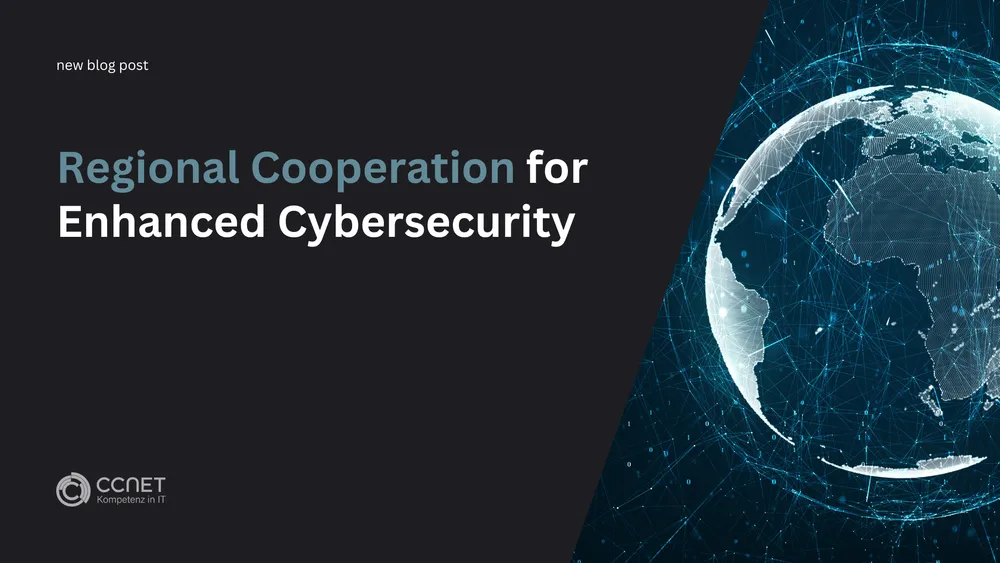
CCNet
Feb 5, 2025 • 3 min read

Definition of Cyberspace and Its Operational Significance
Cyberspace: A Central Domain of Warfare
Cyberspace is now a central component of military operations, but its precise definition and operational significance are often misunderstood or underestimated. In military contexts, cyberspace is frequently viewed as a distinct domain, similar to land, sea, air, and space. But what exactly is cyberspace, and how does it differ from traditional domains of warfare? This blog post explores the definition and operational importance of cyberspace and highlights why a deep understanding of this domain is essential for modern military strategies.
Cyberspace: A Conceptual Space
Cyberspace is often described as an intangible, conceptual space where communication occurs through computer networks. Unlike physical domains such as land or sea, cyberspace is not tangible—it consists of multiple layers, ranging from the human level to IT infrastructures and geographic aspects. These layers interact with each other and form a complex system that underpins all activities within cyberspace.
Learn more about: IT infrastructures
The layers of cyberspace can be divided into several levels:
- Human Layer: This includes the physical people who are active in cyberspace. While humans are not directly part of cyberspace, their activities and interactions shape and influence it.
- Cyber-Human Layer: This level refers to the online identities that people create in cyberspace. These identities can be real or fictional and play an important role in how information is processed and used in cyberspace.
- Cognitive Layer: This involves the knowledge and information generated through human interactions with information systems. This knowledge can be documented in the form of doctrines, norms, standards, and procedures, influencing how cyberspace is used and understood.
- Logical Layer: This layer consists of the information systems themselves, which serve as platforms for the storage, processing, and distribution of information.
- IT Infrastructure Layer: The physical hardware, networks, servers, and all other technical devices that enable cyberspace fall into this category.
- Geographic Layer: This refers to the physical locations of the IT infrastructure and the people who support cyberspace.
Cyberspace as a Military Operations Domain
Cyberspace fundamentally differs from traditional domains of warfare. While physical domains have clearly defined boundaries and territorial restrictions, cyberspace is global and ubiquitous. Actions that occur in one corner of cyberspace can have almost immediate effects elsewhere in the world. This makes cyberspace a unique domain that requires specialized capabilities and strategies to operate effectively within it.
Another difference is the dynamism of cyberspace. It is extremely fluid and requires constant monitoring and updating of the situational picture. Unlike fixed geographical boundaries, cyberspace can be continuously altered, whether through new technologies, software updates, or changes in network structure. This dynamism presents particular challenges for planning and conducting military operations within this domain.
Operational Significance and Challenges
The operational significance of cyberspace lies in its ability to generate both direct and indirect effects on other domains of warfare. Cyber operations can disrupt physical infrastructures, interrupt communications, manipulate information, and exert psychological effects on opposing forces. To achieve these effects, it is crucial that one's own cyber forces have the necessary freedom and control within cyberspace. This control is referred to as cyber superiority, and it is the goal of every military cyber strategy.
Despite these advantages, cyberspace is an extremely challenging domain. The invisibility and intangibility of cyberspace make it difficult to identify and combat threats. Additionally, the global nature of cyberspace complicates the enforcement of national laws and the pursuit of attackers, who often operate from international networks.
Conclusion
Cyberspace is a complex and indispensable domain of modern warfare. Understanding it and the ability to operate within it are crucial for the success of contemporary military operations. Given the dynamism and challenges of cyberspace, military organizations must continuously adapt their strategies and capabilities to ensure cyber superiority and safeguard the security of their digital infrastructures.
FAQ about Cyber Defence Handbook
What is cyberspace in a military context?
Cyberspace is a non-physical space in which digital communication takes place via networks and is considered a separate domain of military operations – similar to land, air, or sea.
What layers does cyberspace consist of?
Cyberspace comprises several layers: from the physical IT infrastructure and information systems to human interactions and cognitive processes.
Why is cyberspace difficult to control?
Because it is global, networked, and constantly changing, there are no fixed boundaries or clear responsibilities – which makes defense and enforcement difficult.
What challenges arise for security in cyberspace?
Invisibility, attackers who are difficult to identify, and the international nature of threats make targeted defense measures particularly complex.
How does cyberspace influence other military domains?
Cyber operations can paralyze communication systems, manipulate information, and trigger psychological effects on enemy forces – with direct consequences for operations on land, at sea, or in the air.
What does cyber superiority mean?
Cyber superiority describes control over cyberspace, which makes it possible to carry out one's own operations safely and to disrupt or prevent enemy activities.
Why is cyberspace so important operationally?
It enables rapid, global effects without physical presence and is therefore a decisive factor for the success of modern military strategies.


